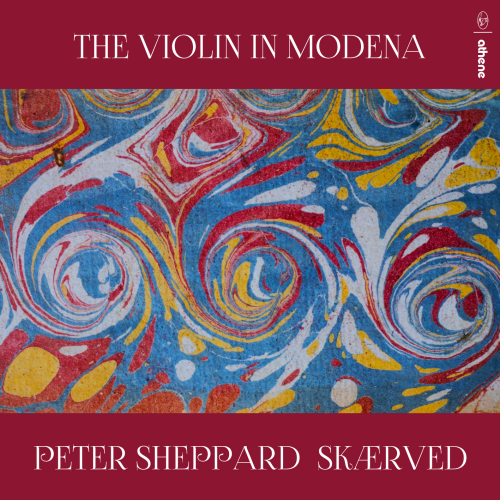Fanfare
The title of this disc, The Violin in Modena, is a bit like coals in Newcastle, given that Modena was the center of both violin makers and performers during the latter portion of the 17th century. Makers such as Amati, Guarneri, and Stradivarius all practiced their craft in the city, and though it was largely a provincial town, performers were able to develop a school of violinists that gained considerable fame during this time. Violinist Peter Sheppard Skærved has made a number of discs that explore the repertory of works for solo violin alone, and here he tackles about 26 pieces from this school; four from the anonymous Rost Codex, eight of the so-called partitas (actually variations) by Giovanni Battista Vitali (1632-1692), and a grab bag of individual movements that were apparently published by Giuseppe Colombi (1635-1694). Leaving aside the anonymous works, three Allemandes and a short sonatina, all designated by their use of violin scordatura or retuning the instrument differently from the usual open fifths, both the Vitali and Colombi are diverse takes on the various dances and generic pieces of the time. The former was probably a continuo player, performing on the cello or bass viol, and though he composed works for this lower register instrument, he also wrote for the violin, as his son Tomaso was to become one of the school’s most important and versatile performers on that instrument. Colombi, whose name is basically reserved for lexicons, was the Modenese maestro di capella, whose music may have been written for his patron, Duke Francesco, who was considered quite proficient on the instrument.
The Vitali set of partitas displays a wide range of technical abilities. The opening Toccata is improvisatory, while the Bergamasca is a rollicking fiddle dance, serving as a nice contrast and opening to the equally lively Ruggiero, with its bouncy passagework. The “Capriccio di tromba” opens with a low register fanfare but with an arpeggiated theme that imitates a clarino improvisation sounding a bit like Antonio Vivaldi. The Furlana is another fiddle tune, almost folklike, and the Barabano concludes the partitas with a bouncy folk tune with some interpolated scurrying moments that shows some internal variation. The anonymous works are characterized by the unconventional scordatura tuning that allows for parallel chords to be done more easily with a flatter bridge on the instrument. The first is a slow, even wistful, sort of solo work, while the second (the first A-Major Allemande) is a swirling sort of exercise. The third (the second A-Major) is filled with a flurry of sequences motives in a faster pace. The final sonata begins with a stately prelude, only to proceed to a more lyrical moment before a concluding on a section replete with horn fifths. The Colombi begins with a sort of violin fanfare in imitation of a trumpet, arpeggiations and all, as every range is explored. The remainder of the pieces are stylized dances, such as the vaguely Scottish-sounding first Allemande, or the light and airy Corrente. In this set, the solo Chaconne has an easy and Celtic-sounding main theme (and here the normal ground is difficult to discern). The instrument flits about with short sequences and running passagework in a rather random manner until the harmony arrives with a short chordal variation. The set concludes with a Barabano, here characterized in passamezzo manner with an ostinato harmony wedded to a folk theme. Violinist Skærved does a nice job of these works, running easily over his instrument, sounding at times like a folk fiddle and at others like a performer quite at home in the roulades that comprise the variations. Alas, much of these works sound the same, and this static quality, no matter the fine performance, makes for a mesmerizing or perhaps even tedious hearing of violin exercises. As a documentary disc this will appeal to violinists interested in both the time and place of composition, especially with respect to the Modenese violin school. As for others, a little will go a very long way.
@divineartrecordingsgroup
A First Inversion Company
Registered Office:
176-178 Pontefract Road, Cudworth, Barnsley S72 8BE
+44 1226 596703
Fort Worth, TX 76110
+1.682.233.4978












